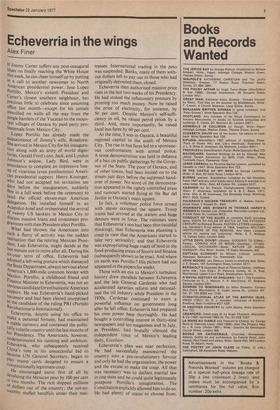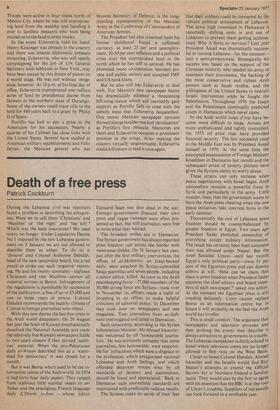Echeverria in the wings
Alex Finer
If Jimmy Carter suffers any post-inaugural blues on finally reaching the White House this week, he can cheer himself up by putting in a call to another newcomer to North American presidential power. Jose Lopez Portillo, Mexico's sixtieth President and Carter's closest southern neighbour, has Precious little to celebrate since assuming office last month—except for his initials stencilled on walls all the way from the jungle hamlets of the Yucatan to the mountain villages of Oaxaca by paid party professionals from Mexico City.
Lopez Portillo has already made the acquaintance of Jimmy's wife, Rosalynn. She arrived in Mexico City for his inauguration along with an army of world dignitories. Gerald Ford's son, Jack, and Lyndon Johnson's widow, Lady Bird, were in attendance to complete an impressive lineup of vicarious (even posthumous) American presidential support. Henry Kissinger, who had not accepted his invitation ten days before the inauguration, suddenly flew in a full week before the ceremony to head the official eleven-man American delegation. He installed himself in an Acapulco hotel and orchestrated the arrival of twenty US bankers in Mexico City to discuss massive loans and investment programmes with then President-elect Portillo.
What had thrown the Americans into such a flurry of activity was the sudden realisation that the retiring Mexican President, Luis Echeverria, might decide at the last minute not to retire after all. During his six-Year term of office, Echeverria had adopted a left-wing posture which dismayed the State Department, always nervous about America's 1,800-mile common border with Mexico. Portillo, a childhood friend and Finance Minister to Echeverria„ was not an Obvious candidate for enthusiastic American suPport. He was Echeverria's hand-picked successor and had been elected unopposed as the candidate of the ruling PRI (Partido Revolucionario I nstitucional).
Echeverria, despite using his office to make a personal fortune, had maintained a stable currency and contained the politi
c. allY volatile country until the last months of its Presidency. The Americans, however, underestimated his cunning and ambition. Echeverria, who subsequently received China's vote in his unsuccessful bid to become UN General Secretary, began to Play trump cards designed to ensure a constitutionally legitimate coup.
He encouraged panic first of all by devaluing the Mexican peso by 100 per cent in two months. The rich shipped millions of dollars out of the country; the not-sowealthy stuffed handfuls under their mat tresses. International trading in the peso was suspended. Banks, many of them without dollars left to pay out to those who had originally deposited them, closed.
Echeverria then authorised massive price rises in the last two weeks of his Presidency.
He had stoked the inflationary pressure by printing too much money. Now he raised the price of electricity, for instance, by 50 per cent. Despite Mexico's self-sufficiency in oil, he raised petrol prices by a third. And, more importantly, he raised local bus fares by 60 per cent.
At the time, I was in Oaxaca, a beautiful regional capital to the south of Mexico City. The rise in bus fares led to a spontaneous confrontation with armed police. A tense demonstration was held in defiance of a ban on public gatherings by the Governor of the State. The poor of Oaxaca, and of other towns, had been incited on to the streets just days before the supposed handover of power. No word of the demonstration appeared in the tightly controlled press and rumours started flying at the Bar del Jardin in Oaxaca's main square.
In fact, a volunteer police force armed with staves occupied the square. Troop trains had arrived at the station and huge detours were in force. The rumours were that Echeverria's son had been shot (wishful thinking); that Echeverria was planning a coup (a view that the Americans started to take very seriously); and that Echeverria was expropriating huge tracts of land in the food-producing states of Sinora and Sinaloa (subsequently shown to be true). And where on earth was Portillo? His picture had not appeared in the papers for weeks.
Those with an eye to Mexico's turbulent history drew parallels between Echeverria and the late General Cardenas who had accelerated agrarian reform and nationalised the oil industry while President in the 1930s. Cardenas continued to exert a powerful influence on government long after he left office. Echeverria had prepared his own power base thoroughly. He had bought a controlling interest in thirty-nine newspapers and ten magazines and in July, as President, had brutally silenced the independent voice of Mexico's leading daily, Excelsior.
Echeverria's plan was near perfection. He had successfully manoeuvred the country into a pre-revolutionary fervour and only he had the organisation, the power and the excuse to make the coup. All that was necessary was to declare martial law in one state and he could quite legitimately postpone Portillo's inauguration. The Constitution explicitly allowed him to do so. He had plenty of states to choose from. Troops were active in four states north of Mexico City where he was still expropriating land from the wealthy and handing it over to landless peasants who were being moved Onto the land in army trucks.
In the event Echeverria held his hand. Henry Kissinger was already in the country and there was intense diplomatic pressure mounting. Echeverria, who was still openly campaigning for the job of UN General Secretary with lobbyists in New York, may have been stayed by this dream of power on a world stage. He was not without vengeance, however. At 10 p.m. of his final day of office, Echeverria expropriated one million acres of land by presidential decree from farmers in the northern state of Durango. Some of the owners could trace title to the land for 440 years back to a grant by Philip II of Spain.
Portillo has had to pay a price to the Americans for his succession. Nearly a quarter of his Cabinet has close links with the United States. Several have studied at American military establishments and Felix Jalvan, the Mexican general who has become Secretary of Defence, is the longstanding representative of the Mexican Army at the Conference of Commanders of American Armies.
The President has also inherited from his former childhood friend a collapsed currency, at least 25 per cent unemployment, 30-50 per cent inflation and a political crisis over the expropriated land in the north which he has still to unravel. He has promised more co-operation between private and public sectors and accepted IMF and US bank loans.
But he also still has Echeverria to deal with. For Mexico's new newspaper baron has dramatically adopted a threatening left-wing stance which will inevitably gain support as Portillo fails to cope with the unholy mess that Echeverria bequeathed. One recent Mexican newspaper cartoon showed a large boulder marked 'devaluation' as Portillo's first obstacle. Memories are short and Echeverria occupies a prominent position in the wings. After making the country virtually ungovernable, Echeverria could still return to lead it once again.



































 Previous page
Previous page